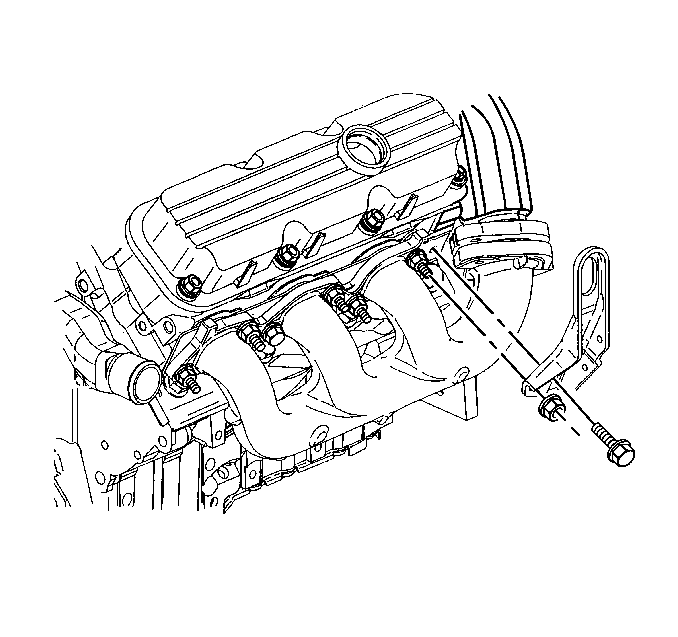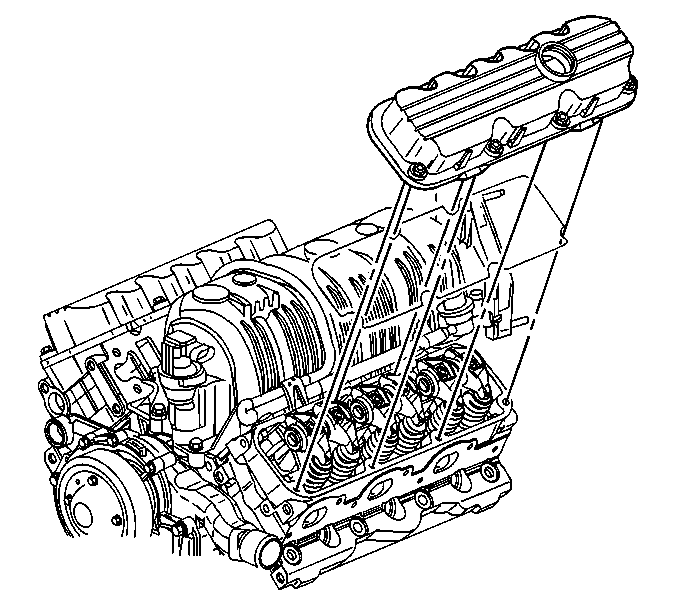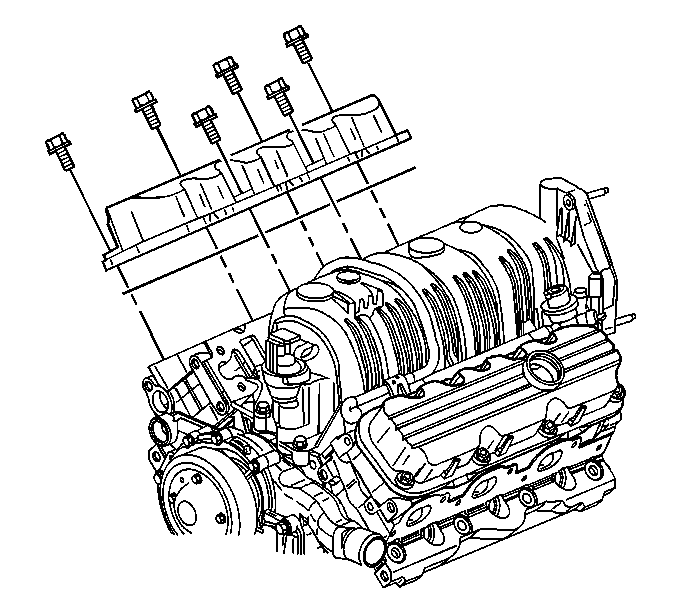Valve Rocker Arm Cover Replacement Front
Removal Procedure
- Disconnect the battery ground (negative) cable. Refer to Battery Negative Cable Disconnection and Connection in Engine Electrical.
- Remove the engine lift bracket from the exhaust manifold studs.
- Remove the fuel injector sight shield. Refer to Fuel Injector Sight Shield Replacement .
- Remove the right engine mount strut bracket. Refer to Engine Mount Strut Bracket Replacement .
- Disconnect the left (front) spark plug wires. Refer to Spark Plug Wire Harness Replacement in Engine Electrical.
- Remove the left (front) spark plug wire cover from the left (front) valve rocker arm cover. Refer to Spark Plug Wire Harness Replacement in Engine Electrical.
- Remove the left (front) valve rocker arm cover bolts.
- Remove the left (front) valve rocker arm cover.
- Remove the left (front) valve rocker arm cover gasket.
- Clean the sealing surface on the cylinder head and the valve rocker arm cover with a degreaser.
- Clean the valve rocker arm cover bolts of all thread locking adhesive.


Important: If the valve rocker arm cover adheres to the cylinder head, remove the valve rocker arm cover by bumping the end of the valve rocker arm cover with palm of hand or with a soft rubber mallet.
Installation Procedure
- Install the new valve rocker arm cover gasket. Make sure that valve rocker arm cover gasket is seated properly in the valve rocker arm cover groove.
- Install the left (front) valve rocker arm cover.
- Apply thread lock compound GM P/N 12345493 or equivalent, to the valve rocker arm cover bolt threads.
- Install the left (front) valve rocker arm cover bolts.
- Install the left (front) spark plug wire cover to the left (front) valve rocker arm cover. Refer to Spark Plug Wire Harness Replacement in Engine Electrical.
- Connect the left (front) spark plug wires. Refer to Spark Plug Wire Harness Replacement in Engine Electrical.
- Install the right engine mount strut bracket. Refer to Engine Mount Strut Bracket Replacement .
- Install the fuel injector sight shield. Refer to Fuel Injector Sight Shield Replacement .
- Install the engine lift bracket to the exhaust manifold studs.
- Connect the battery ground (negative) cable. Refer to Battery Negative Cable Disconnection and Connection in Engine Electrical.
- Inspect for proper fluid levels.
- Inspect for oil leaks.

Notice: Use the correct fastener in the correct location. Replacement fasteners must be the correct part number for that application. Fasteners requiring replacement or fasteners requiring the use of thread locking compound or sealant are identified in the service procedure. Do not use paints, lubricants, or corrosion inhibitors on fasteners or fastener joint surfaces unless specified. These coatings affect fastener torque and joint clamping force and may damage the fastener. Use the correct tightening sequence and specifications when installing fasteners in order to avoid damage to parts and systems.
Tighten
Tighten the left (front) valve rocker arm cover bolts to 10 N·m
(89 lb in).

Tighten
Tighten the engine lift bracket bolt and nut to 30 N·m
(22 lb ft).
Valve Rocker Arm Cover Replacement Rear
Removal Procedure
- Disconnect the battery ground (negative) cable. Refer to Battery Negative Cable Disconnection and Connection in Engine Electrical.
- Remove the fuel injector sight shield. Refer to Fuel Injector Sight Shield Replacement .
- Remove the generator. Refer to Generator Replacement in Engine Electrical.
- Remove the engine mount struts. Refer to Engine Mount Strut Replacement .
- Rotate the engine for access.
- Remove the right (rear) spark plug wires. Refer to Spark Plug Wire Harness Replacement in Engine Electrical.
- Remove the EVAP purge solenoid and the brace. Refer to Evaporative Emission Canister Purge Solenoid Valve Replacement in Engine Controls - 3.8L.
- Remove the right (rear) valve rocker arm cover bolts.
- Remove the right (rear) valve rocker arm cover.
- Remove the right (rear) valve rocker arm cover gasket.
- Clean the sealing surface on the cylinder head and the valve rocker arm cover with a degreaser.
- Clean the valve rocker arm cover bolts of all thread locking adhesive.

Important: If the valve rocker arm cover adheres to the cylinder head, remove the valve rocker arm cover by bumping the end of the valve rocker arm cover with the palm of your hand or a soft rubber mallet.
Installation Procedure
- Install the new valve rocker arm cover gasket. Ensure that the valve rocker arm cover gasket is seated properly in the valve rocker arm cover groove.
- Install the right (rear) valve rocker arm cover.
- Apply thread lock compound GM P/N 1234593 or equivalent to the valve rocker arm cover bolt threads.
- Install the right (rear) valve rocker arm cover bolts.
- Install the EVAP purge solenoid and the brace. Refer to Evaporative Emission Canister Purge Solenoid Valve Replacement in Engine Controls - 3.8L.
- Install the right (rear) spark plug wires. Refer to Spark Plug Wire Harness Replacement in Engine Electrical.
- Return engine to proper position.
- Install the engine mount struts. Refer to Engine Mount Strut Replacement .
- Install the generator. Refer to Generator Replacement .
- Install the fuel injector sight shield. Refer to Fuel Injector Sight Shield Replacement .
- Connect the battery ground (negative) cable. Refer to Battery Negative Cable Disconnection and Connection in Engine Electrical.
- Check for proper fluid levels.
- Check for oil leaks.

Notice: Use the correct fastener in the correct location. Replacement fasteners must be the correct part number for that application. Fasteners requiring replacement or fasteners requiring the use of thread locking compound or sealant are identified in the service procedure. Do not use paints, lubricants, or corrosion inhibitors on fasteners or fastener joint surfaces unless specified. These coatings affect fastener torque and joint clamping force and may damage the fastener. Use the correct tightening sequence and specifications when installing fasteners in order to avoid damage to parts and systems.
Tighten
Tighten the right (rear) valve rocker arm cover bolts to 10 N·m
(89 lb in).
